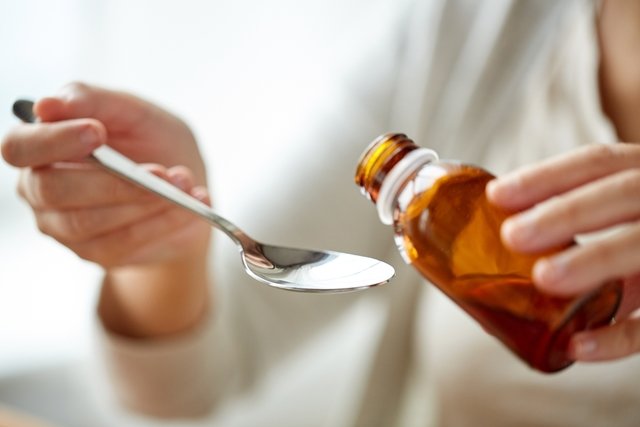Some tips that help to stop coughing are drinking carrot syrup, drinking plenty of water and washing your nose with saline, for example, because they hydrate the airways, facilitate the elimination of secretions and reduce throat irritation.
In addition, some medications such as acetylcysteine, loratadine and ambroxol can also be prescribed by the doctor to relieve allergic, dry or phlegm coughs.
Find out more about coughing and see other tips that help you stop coughing in the following video:
What to do to get rid of a cough quickly
Some tips that help relieve coughs are:
1. Take carrot syrup
Carrot syrup is a good natural and homemade option to combat coughs in cases of flu and colds, because it has a moisturizing and expectorant action, lubricating the throat and reducing irritation. Discover other syrups recommended for coughs.
To prepare this syrup, simply grate 1 carrot and place in a jar, covering with 2 tablespoons of sugar, juice of ½ lemon and 1 teaspoon of honey, mixing everything with a spoon. Cover the pot and let the mixture rest overnight. Take 1 tablespoon, twice a day.
2. Drink 2 liters of water a day
Drinking 2 liters of water a day, at room temperature, is a good way to stop coughing, because it hydrates the airways and facilitates the elimination of secretions, relieving throat irritation.
However, the recommended amount of water varies depending on age, body weight and season. Check the amount of water indicated for each person.
3. Drink lemon juice with honey
Lemon juice with honey helps stop coughing because it has antifungal, calming and antibacterial properties that help moisturize the throat, fight flu and colds, naturally helping the cough reflex. See other juices that help relieve coughs.
To prepare this juice, you can put the juice of 1 lemon, 1 dessert spoon of honey and 200 ml of filtered or boiled water in a glass. Mix all the ingredients well and drink 1 glass of this juice a day.
4. Vaping with peppermint oil
Steaming with peppermint essential oil helps dilute secretions, unblock the nose and stop coughing in cases of flu, sinusitis or respiratory allergies. In addition, you can also vaporize with eucalyptus essential oil.
To vaporize, you must dilute 8 drops of peppermint essential oil in a basin with 1 liter of hot water. Then, cover your head with a towel in the basin, breathing in the steam for 10 minutes. Repeat this vaporization 2 to 3 times a day.
5. Drink eucalyptus tea
Eucalyptus tea helps stop coughs as it contains tannins, flavonoids and aldehydes, which are bioactive compounds with antiseptic, antioxidant and antispasmodic action, which strengthen the immune system, preventing and fighting infections of the respiratory system.
To make eucalyptus tea, you can add 1 tablespoon of chopped eucalyptus leaves to 1 cup of boiling water. Cover the cup, let it rest for 10 minutes and drink up to 3 cups of this tea per day. Check out more teas recommended for coughs.
6. Take a warm or hot shower
Taking a warm or hot shower, with the bathroom door open, is a natural way to humidify the air in the room, reducing throat irritation, facilitating the elimination of phlegm and relieving coughs.
To do this, simply leave the shower open for a few minutes while you are taking a shower, drying your body or putting on your clothes, for example.
7. Inhale with lemongrass tea
Inhaling lemongrass tea helps to decongest and reduce irritation in the respiratory tract, relieving coughs.
This inhalation can be done by diluting 1 tablespoon of lemongrass leaves in a basin with 1 L of boiling water. Place the basin on a table and position your head over the basin. Cover your head and pelvis with a towel, breathing in the steam for 15 minutes. Do this inhalation once a day.
8. Gargle with water and salt
Gargling with warm water and salt helps to stop coughing, as it has antibacterial properties, removing bacteria that can cause inflammation and infection in the throat, and relieving coughs.
To gargle, place a tablespoon of salt in a glass of warm water and mix well with a spoon. Then, gargle for as long as you can and then spit out the water, repeating this procedure 3 times a day.
9. Wash your nose with serum
Nasal washing with saline helps to stop coughing because it eliminates excess secretions in the nose or sinuses, facilitating their elimination and relieving coughs in cases of sinusitis and rhinitis, for example.
To wash the nose, fill a syringe with 10 or 20 mL of sterile 0.9% saline solution. Then, lean your body forward and your head to the side. Then, position the syringe at the entrance to one of the nostrils and press until the serum comes out of the other nostril. See how to wash your nose.
10. Using cough medicine
Some medications that may be recommended by your doctor to relieve coughs include levodropropizine, dropropizine and clobutinol, which relieve throat irritation and dry coughs.
Medications such as ambroxol, guaifenesin and acetylcysteine can be recommended to relieve coughing with phlegm.
To combat coughing caused by allergies, your doctor may prescribe medications such as loratadine, dexchlorpheniramine and dextromethorphan. Check out all the remedies recommended to stop coughing.
11. Use a humidifier
Using a room humidifier can help relieve a cough more quickly, especially when the air is very dry, as it increases the humidity in the air, reducing inflammation or irritation in the throat.
Furthermore, using room humidification helps keep the airways hydrated and open the airways, facilitating the release of phlegm and improving breathing.
12. Avoid foods that cause reflux
One of the causes of coughing is gastroesophageal reflux, which occurs due to the contents of the stomach returning to the mouth, causing throat irritation and resulting in a dry cough, especially at night.
Therefore, it is important to avoid foods that can worsen reflux, such as drinks with caffeine or alcohol, chocolate, citrus fruits, fried foods, fatty or spicy foods or tomato sauce, for example. See what reflux food should be like.
13. Use one more pillow to sleep
Using another pillow to sleep helps to relieve coughing, especially nighttime coughing, as when lying down, phlegm can remain and accumulate in the throat, making it more difficult to drain, as lying down does not have the force of gravity.
In this way, the cough reflex is activated, in an attempt by the body to remove phlegm from the airways, making the cough worse at night.
Furthermore, using another pillow to sleep also helps with gastroesophageal reflux, preventing stomach contents from returning to the mouth, which can cause throat irritation and nighttime coughing. See other causes of night cough.
When to go to the doctor
It is advisable to consult an otorhinolaryngologist or pulmonologist when, in addition to coughing, other symptoms such as bloody phlegm, high fever and greenish or yellowish secretions also appear.
If you want to see a doctor, make an appointment near your region:
Taking care of your health has never been easier!

Sign up for our newsletter and stay up to date with exclusive news
that can transform your routine!
Warning: Undefined array key "title" in /home/storelat/public_html/wp-content/plugins/link-whisper-premium/templates/frontend/related-posts.php on line 12
Warning: Undefined array key "title_tag" in /home/storelat/public_html/wp-content/plugins/link-whisper-premium/templates/frontend/related-posts.php on line 13




